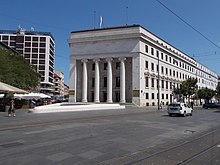
Back البنك الوطني الكرواتي Arabic Bancu Nacional de Croacia AST Харвацкі народны банк Byelorussian Hrvatska narodna banka BS Banc Nacional Croat Catalan Kroatische Nationalbank German Εθνική Τράπεζα της Κροατίας Greek Banco Nacional de Croacia Spanish بانک ملی کرواسی Persian Banque nationale de Croatie French
 | |
 | |
| Headquarters | Trg hrvatskih velikana 3, Zagreb, Croatia |
|---|---|
| Coordinates | 45°48′44″N 15°59′03″E / 45.81222°N 15.98417°E |
| Established | 21 December 1990 |
| Ownership | 100% state ownership[1] |
| Governor | Boris Vujčić |
| Central bank of | Croatia |
| Reserves | $14.54 billion[1] |
| Website | www |
The Croatian National Bank (Croatian: Hrvatska narodna banka; pronounced [xř̩ʋaːtskaː nǎːrodnaː bâːŋka]), known until 1997 as the National Bank of Croatia (Croatian: Narodna banka Hrvatske), is the Croatian member of the Eurosystem and has been the monetary authority for Croatia from 1991 to 2022, issuing the Croatian dinar until 1994 and subsequently the Croatian kuna until Croatian adoption of the euro on 1 January 2023. It has also been Croatia's national competent authority within European Banking Supervision since 2020.[2] It was initially established in 1972 under the decentralization of the National Bank of Yugoslavia, and became a fully-fledged central bank in late 1991 with the independence of Croatia.
The acronym for the National Bank in Croatian, as used in their logo, is HNB. The Bank uses the English-language acronym CNB in its publications in English.[3]
The CNB's role was specified by the Constitution of Croatia which was passed by the Parliament of Croatia on 21 December 1990. In performing its duties, the CNB acts as an independent institution responsible to the Parliament. The bank has a share capital of 335,000,000 euros (c. US$450 million).[4]
- ^ a b Weidner, Jan (2017). "The Organisation and Structure of Central Banks" (PDF). Katalog der Deutschen Nationalbibliothek.
- ^ "National supervisors". ECB Banking Supervision.
- ^ Thirty Years of Challenge, Zagreb: Croatian National Bank, 2021
- ^ "O Hrvatskoj narodnoj banci". hnb.hr (in Croatian). Croatian National Bank. Archived from the original on 26 November 2012. Retrieved 1 April 2012.
© MMXXIII Rich X Search. We shall prevail. All rights reserved. Rich X Search